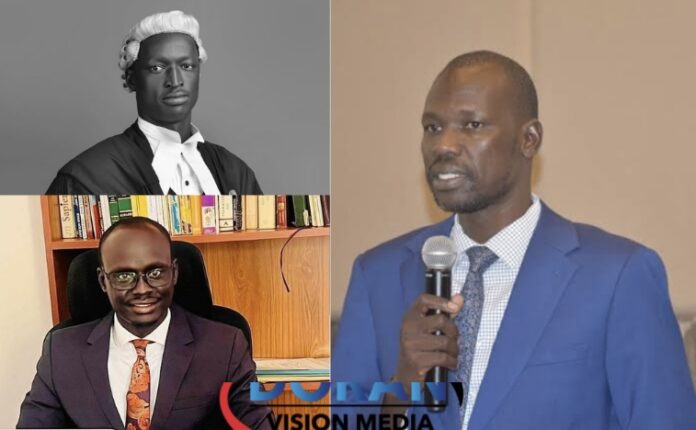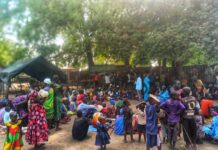
Two of South Sudan’s most prominent legal professionals have raised serious concerns about the government’s legal preparedness in the high-profile case against First Vice President Dr. Riek Machar and several other senior officials, following the Justice Ministry’s announcement of formal charges linked to the March 2025 Nasir attack.
The criticism comes just a day after Justice Minister Dr. Joseph Geng Akech confirmed that Machar and seven other SPLM-IO leaders would face prosecution over the Nasir conflict between government soldiers and White Army youth group in Upper Nile State.
Lawyer Makoi Majak, a practicing attorney in Juba, called out the Justice Ministry for what he termed a serious legal blunder during Thursday’s press briefing. Majak accused the Ministry of inventing an offence not recognized under South Sudanese law and citing incorrect legal provisions.
“Although press briefings aren’t part of a trial, it is troubling that the government’s senior-most legal authority effectively coined a new offence not found in our penal code—and then cited the wrong law to back it up,” Majak said.
Majak also pointed out that “crimes against humanity” is not codified under the 2008 Penal Code Act, which forms the backbone of South Sudan’s criminal justice system.
He explained that such crimes were only introduced conceptually through Chapter V of the Revitalized Peace Agreement (R-ARCSS) of 2018, which envisioned the creation of a Hybrid Court for South Sudan—a court that has not yet been established.
“The Ministry of Justice must refrain from misleading the public on matters of such national importance,” Majakwarned. “They are paid to carry out their duties competently, professionally, and ethically.”
Joining the chorus of concern, Lawyer Akot Makur Chuot described the government’s case against Machar as “dead on arrival”, citing fundamental flaws in the legal framework presented by the Justice Ministry.
Chuot directly challenged the sections of law referenced by Minister Geng Akech, calling them “pathetically inaccurate.”
“Section 186 of the Penal Code Act, 2008, which the Minister cited as relating to crimes against humanity, deals with fouling public water sources. And Section 334 pertains to housebreaking by night. These are not even remotely relevant,” Chuot stated.
He argued that the misapplication of law undermines the credibility and seriousness of the government’s case and reflects a lack of readiness to pursue such a sensitive and politically charged prosecution.
“One could say this case is partly dead-on arrival,” he concluded.
The legal criticisms add to the growing uncertainty surrounding the case, which has already drawn widespread domestic attention and international scrutiny.
Observers warn that any procedural or legal missteps could jeopardize South Sudan’s fragile peace process and undermine public trust in the rule of law.
In a major political development, President Salva Kiir has suspended Dr. Riek Machar from his role as First Vice President, along with Minister of Petroleum Puot Kang Chuol, pending the outcome of the case. The announcement was broadcast on SSBC shortly after the Ministry of Justice released the formal charges.
Despite the controversy, the Justice Ministry maintains that the case will proceed to trial before a competent court, with due process observed. The opening and closing sessions of the trial are expected to be open to accredited media, to ensure transparency and public accountability.
However, legal experts insist that without proper legal grounding and accurate application of law, the trial risks becoming a political spectacle rather than a genuine pursuit of justice.




